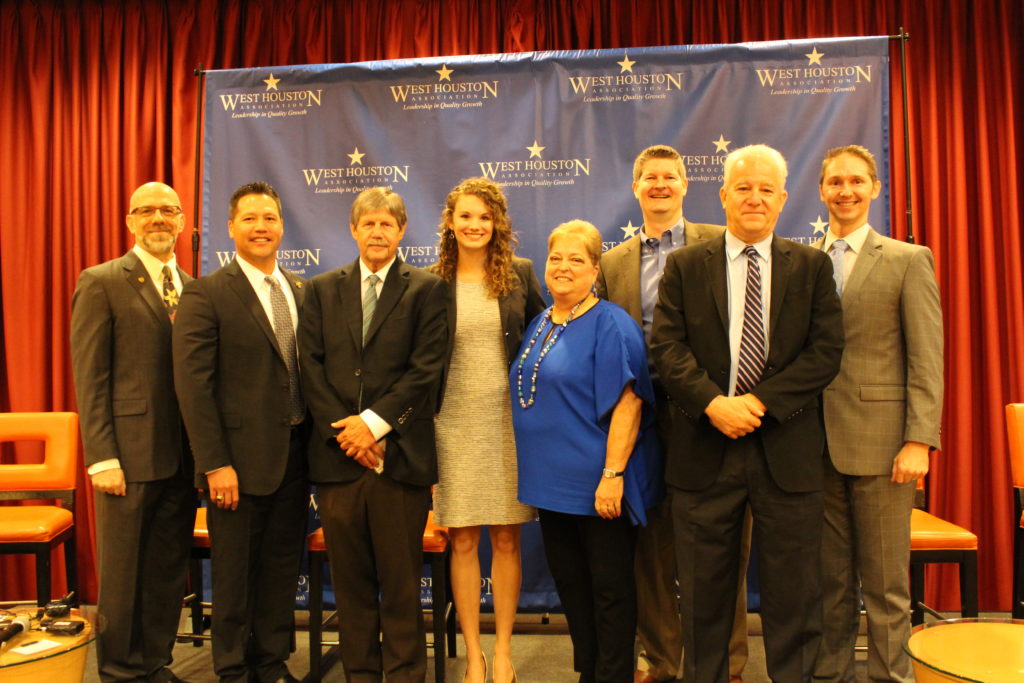
The 1987 Brundtland Report entitled Our Common Future defines sustainability as “[a practice that] seeks to meet the needs and aspirations of the present without compromising the ability to meet those of the future.” As the population in the West Houston Region is expected to grow from 1.7M to 3.26M by the year 2060 the conversation of how to sustainably move forward is key to our community’s success. On August 22nd West Houston Association’s Sustainable Infrastructure Committee hosted the Building Forward: Sustainable Growth technical forum to discuss how to become better stewards of the environment. The breakfast was held at the Embassy Suites – Energy Corridor and boasted a panel of the following industry experts:
- Heath Melton of Howard Hughes Corporation
- Tory Gattis of the Center for Opportuniy Urbanism
- Lisa Clark of Ryko Development, Inc.
- Jim Blackburn of Rice University
- Bill Fulton of the Kinder Institute
- Michael Bloom of R.G. Miller Engineers
The panel discussion focused on how to create a region which will be able to maintain and thrive with the large population increase coming in the not-so-distant future. Bloom reported that along with sustainability the region should also aim to become more resilient. The Urban Land Institute defines resilience as “the ability to prepare and plan for, absorb, recover from, and more successfully adapt to adverse events.” Gattis stated that an important aspect of resiliency is to keep the housing market affordable. Housing prices that continue to rise will not be sustainable without average income rising at the same rate. Financial resources also play a role in a community’s resiliency. Many situations that were hard to recover from after Hurricane Harvey were the result of financial hardship. Many communities had residents that not only had to replace items but entire homes with financial resources that were not equipped for devastation of this magnitude. Clark stated that Harvey also showed that the built environment is helping our region remain resilient. Few homes built to the 2009 standards flooded, however, our region does need to address the issues of the old infrastructure.
The panelists also discussed how our region will responsibly accommodate the expected population increase and meet the new market demands. Melton and Clark reported that the industry needs to continue the trend of listening to the growing and changing market. The Millennial generation is more interested in smaller more affordable lots with less property to maintain and a closer proximity to amenities. Walkability and less time spent on the road is becoming a priority. The panel commented on the densification that will likely come to West Houston if jobs continue to decentralize to accommodate their employees. Fulton reported that this new mindset will likely transform our transportation planning. Transportation is quickly becoming an on-demand service and the use of automated vehicles will decrease the need for individuals to own their own automobiles. Melton reported that Howard Hughes Corporation is looking into creating parking garages that can be easily converted into office space in order to adapt to the changing transportation opportunities.
The market is also looking for homes and communities that are actively working to conserve energy. Blackburn reported that the energy footprint left by our region will be an important factor in building a resilient future. He also suggested incorporating the cost of carbon into the business model for our region to begin efforts in reducing the carbon footprint. Blackburn counseled that our industry should start talking to farmers who may focus on carbon farming in the future. Clark and Melton reported that their communities are working toward sustainable efforts such as purple pipe systems to conserve water and help our region for the long-term.
Currently our region is working hard towards making significant improvements to our flood control system. Fulton reported that floodplain mapping is limited and has created the misconception that if your home is not in the floodplain it will not flood. Education on this topic will be key to helping the public understand their risk. Blackburn also urged that much work needs to be done downstream to help move the water away from resident homes. Gattis echoed the sentiment by stating that this may be an opportunity to build multi-use flood control projects. Detention areas can be used as park or trail spaces for recreation throughout the year when there is no danger of flooding.
WHA was honored that our panelists volunteered their time to talk to our members and move this conversation forward. Growth is inevitable, and our region needs to work together to move forward responsibly. Thank you to our panelists and Sustainable Infrastructure Committee for making this event happen. Check out WHA’s Past Events page to see more on our speakers and the forum!
